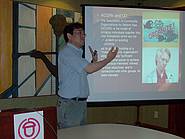Your cart is currently empty!
South Korean Organizer Speaks to ACORN about Organizing in Asia

 NEW ORLEANS – What is the meaning of community? With that question, South Korean community organizer Hyo-Woo Na began a presentation to a room full of listeners at ACORN’s headquarters in New Orleans May 16.
NEW ORLEANS – What is the meaning of community? With that question, South Korean community organizer Hyo-Woo Na began a presentation to a room full of listeners at ACORN’s headquarters in New Orleans May 16.
In South Korea, the most-wired country in the world and one of Asia’s wealthiest nations, internet communications have expanded the definition of community, especially for younger generations. Na said that the internet has become a useful tool for helping people make initial contact, but after that, face to face meeting is still the best way to proceed.
Community organizing, applying the philosophy of Saul Alinsky and other progressive thinkers, began in many Asian countries in the early 1970s, just as it did in the United States. South Korea was first organized in 1968. The Philippines, Indonesia and India were also among the first countries to bring about changes for the poor through grassroots organizing. Countries that are still ruled by brutal dictatorships, such as North Korea and China, are not yet organized.
Wade Rathke, ACORN’s founder, introduced Na and told listeners that Na had been very active in the democracy movement in South Korea. In North Korea, however, Na explained that military rule remains so powerful that very little information gets beyond its borders. Na has had no word from his grandmother in 40 years.
In the early days of community organizing in his home country, Na saw many of his friends go “to jail or to Heaven” in the struggle to bring about democracy in a country that was at that time ruled by a military dictatorship. Now that democracy has been achieved in South Korea, organizers can focus on winning changes for the poor and labor organizing.
In South Korea, community organizations get much of their funding from the Catholic Church. Speaking with ACORN organizers from the United States, they learned about ACORN’s dues-based model and found themselves presented with a challenge: how could they organize without being dependent on existing institutions?
Na experimented with the ACORN approach. He found it difficult to collect dues, especially when he began with a staff of five organizers that after the first week was down to three and a half. But they soon learned some tricks. The apartment buildings where the poor lived were gated and guarded, but entrance could be bought by offering a guard a cigarette or two. Once they were in, people were more interested in speaking with the organizers if they offered a slice of watermelon. Na found that when he came across people who had just one issue they felt passionate about, he found members.
Many South Korean organizers are women. While women and men have equal rights, they tend to fill different roles in the community. South Korea is an industrial country, so most of the men are working in factories outside of the community. Women, on the other hand, spend most of their time in the community, close to their neighbors, so they often have an easier time building a grassroots movement.
Na and his 3.5 organizers knocked on 8,000 doors in two and a half months. Accounting for population differences – South Korea has about one-sixth the population of the United States – the two countries have comparable numbers of organizers – 300 in South Korea; 2,000 in the U.S. The challenge before us all now, Na concluded, is to find a way to work together, to use grassroots organizing to bring about positive change in a global community.
